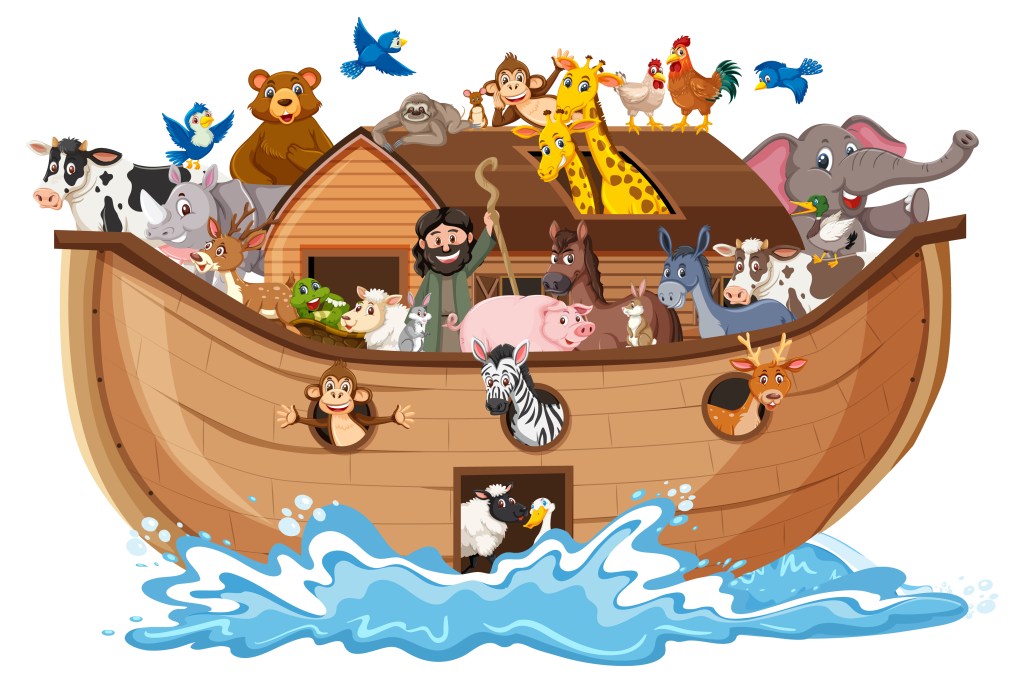I’ve often wondered why parents decorate their children’s rooms with Noah’s Ark theming.

The cartoon drawings of a little boat with cute animals are adorable. Who doesn’t like animals, right? The light blue of the water makes a great color to paint the walls. The waves on top make a cute border.

At the opposite end of the little boat, we have a beautiful rainbow—that symbol of God’s promise.
But as we go through the Flood over the next several weeks, you might start agreeing with me: it’s curious why we’d decorate this way.
As I’ve written before, Genesis is divided based on the English phrase, “This is the account of…”. In Hebrew, it’s the word toledoth. Today, we begin the third toledoth of Genesis which ends at the conclusion of chapter 9.
We read in Genesis 6:9-12:
9 This is the account of Noah and his family.
Genesis 6:9-12, New International Version
Noah was a righteous man, blameless among the people of his time, and he walked faithfully with God. 10 Noah had three sons: Shem, Ham and Japheth.
11 Now the earth was corrupt in God’s sight and was full of violence. 12 God saw how corrupt the earth had become, for all the people on earth had corrupted their ways.
The last toledoth ended by stating, “Noah found favor in the eyes of the Lord” (Genesis 6:8). Here at the beginning of this section of Genesis, we start seeing why Noah was favored.
The Lord describes Noah by using contrast with humanity. “Noah was a righteous man” (verse 9); humanity was corrupt (verse 11). Noah was “blameless among the people” (verse 9); humanity was full of violence (verse 11). Noah “walked faithfully with God” (verse 9); humanity was thoroughly corrupted (verse 12).
Now, before you’re tempted to think the point of this passage is to say, “Be like Noah and not like the pagans,” it’s not. Noah was not perfect. The text never said he was. Again, the text sets up Noah compared to the rest of humanity of his time.

The point is not to “be like Noah” but to “behold God’s grace.” Going back to Genesis 6:8, we see that “Noah found favor in the eyes of the Lord.”
This is the key to interpreting Noah’s character. The Hebrew word translated as “found” means “to come upon or to meet accidentally.” The idea is that Noah was not deserving of this favor, but it came upon Him as a gracious act of the Lord. Again, Genesis 6:8 tells us the facts while Genesis 6:9-12 gives us the support for the claim.
Noah was a righteous man because he was the recipient of the Lord’s grace. Noah was a recipient of the Lord’s grace because he was a righteous man. The Lord bestowed grace on Noah and Noah was seeking the Lord.
Again, the point is to see God’s grace. The world at the time of Noah was completely evil and totally corrupt. Noah stood out like a star in the night sky because he pursued the Lord.
When we study the Flood, we often focus on the judgment (understandably so). But this setup in Genesis 6:9-12 seems to establish not why the world was destroyed but why Noah—or anyone, for that matter—was saved from it.
This passage calls us to see the Lord’s grace: His undeserved, unearned, merciful grace. Humanity had spiraled to the point where the Lord regretted even making us. Noah stood out as the sole recipient of the Lord’s favor because he was the sole person seeking His face.
When the Lord’s eyes see your neck of the woods, are you seeking Him?
You may have noticed the column at the right of my blog now holds sponsors for my blog. This helps me pay for the costs associated with maintaining my website. If you need Christian books and resources, check out Churchsource.com. When it’s time to update calendars for 2025, check out the amazing products at Calendars.com. And just to be clear: when you purchase something by clicking through my links on my website, I earn a small commission. If you do, thanks!

